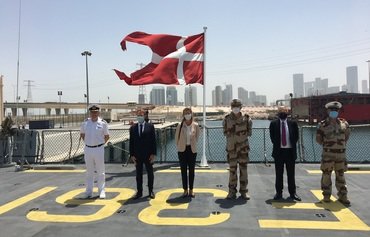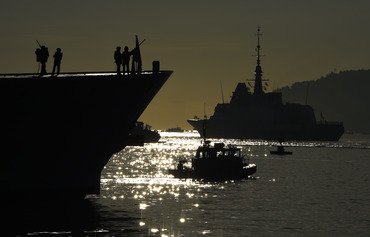A European-led naval mission to monitor Gulf waters that is to be headquartered in the UAE will complement the work of the US-led international maritime coalition in the region, experts told Al-Mashareq.
The European mission will work in close co-ordination with the US-led mission to ensure freedom of navigation in the region and deter Iran-aligned forces from carrying out attacks against ships and tankers in Gulf waterways, they said.
The new initiative, announced November 24th, sends a strong message to Iran's Islamic Revolutionary Guard Corps (IRGC) and its proxies, they added.
"We formally agreed that the command centre of the European maritime surveillance initiative will be on UAE territory," French defence minister Florence Parly told AFP.
![Emirati and French soldiers gather at the military naval base in Abu Dhabi during the 10th anniversary celebration of the original bilateral defence agreement between the UAE and France. [Photo via French Ambassador to the UAE Ludovic Pouille's Twitter account]](/cnmi_am/images/2019/12/16/21264-UAE-France-celebration-600_384.jpg)
Emirati and French soldiers gather at the military naval base in Abu Dhabi during the 10th anniversary celebration of the original bilateral defence agreement between the UAE and France. [Photo via French Ambassador to the UAE Ludovic Pouille's Twitter account]
![French Defence Minister Florence Parly visits the French Naval base's operations room in the UAE that will lead Europe's maritime mission to monitor Gulf waters. [Photo via Florence Parly's Twitter account]](/cnmi_am/images/2019/12/16/21265-UAE-French-operations-600_384.jpg)
French Defence Minister Florence Parly visits the French Naval base's operations room in the UAE that will lead Europe's maritime mission to monitor Gulf waters. [Photo via Florence Parly's Twitter account]
It will be run by around 10 to 15 staff members deployed at the French naval base in Abu Dhabi who will "contribute to making maritime navigation in the Gulf as safe as possible", she said during a visit to the base.
Parly did not identify the countries that would be joining the mission, saying some were still waiting for their respective parliaments to ratify their participation in the initiative.
Earlier in November, the US launched a maritime coalition based in Bahrain to provide protection to shipping in Gulf waters and the strategic Strait of Hormuz.
Military co-operation
Successive Iranian threats and attacks in Gulf waters have prompted the international community to take a firm stand, retired UAE army officer Abdullah al-Ameri told Al-Mashareq.
The US-led mission seeks to secure the region through an international alliance that co-operates with the militaries of the Gulf states, he said, noting that the French-led European coalition will complement these efforts.
Military co-operation between France and the UAE "is not recent, as the French naval base has existed for years and conducts its security and reconnaissance missions in co-operation with the UAE naval units", he said.
"These tasks will be expanded under the European mission to secure the entire region in full and total co-operation with the US-led coalition operations room," he added.
The announcement of the mission confirms "the international determination to counter Iranian threats to all Gulf countries", al-Ameri said.
'No compromise' on regional security
European participation in the effort to maintain the security of Gulf waterways is "necessary and important" from a military and tactical standpoint, Egyptian strategy analyst Yahya Mohammed Ali told Al-Mashareq.
The region is vast and requires a military presence that is capable of intervening quickly to deter any potential threats -- principally from the IRGC and its proxies, he said.
The IRGC relies on the region's waterways to move about and connect with its proxies, Ali said, relying mainly on military speedboats to conduct its operations.
Intensive deployment and full co-ordination between the European mission and the US-led coalition will be needed to keep the IRGC in check, he said.
The European mission will complement the efforts of the US-led mission and "will allow for more accuracy in surveillance, both directly and through satellites, thus reducing the likelihood of a breach by the IRGC", Ali said.
It also will allow for quicker intervention, via European naval units, he added.
"The IRGC may think there is no international consensus against its policies in the Middle East and that it has succeeded in dividing international ranks with its political ploys," political researcher Abdul Nabi Bakkar told Al-Mashareq.
But it has failed to understand that allies will not compromise on the region's security, he said, adding that "Gulf shipping lanes are a red line that cannot be crossed under any circumstance".
Navigation in the Gulf is a matter of national security for Gulf countries and is also an international concern, he said, as any tension in the region has an adverse impact on the global economy.

![French Defence Minister Florence Parly stands with senior officials at the French military base in Abu Dhabi during a recent visit to the UAE. [Photo via Florence Parly's Twitter account]](/cnmi_am/images/2019/12/16/21263-UAE-France-minister-600_384.jpg)





